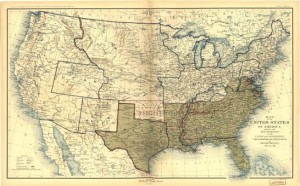 Today’s Richmond Times Dispatch reports on activity along Virginia’s peninsula, as well as revivals within Virginia regiments.
Today’s Richmond Times Dispatch reports on activity along Virginia’s peninsula, as well as revivals within Virginia regiments.
All is quiet on the Peninsula since the late gunboat fight. The forces engaged in the actions with the steamers at Deep Bottom and Turkey Island were eight companies of the 26th Va. regiment and one section each of Capt. Armistead’s and Capt. French’s light batteries, the whole under the command of Lt. Col. Couneil, of the 26th. All the forces belong to Wise’s brigade, a command that has always done good service when the enemy gave it a chance to meet them. In the engagement at Turkey Island the monitor only fired one shot, and that after she had gotten nearly a mile down the river. This shell exploded among the artillery just as they were limbering up, wounding three members of French’s battery–one of them private Gibson, of Giles C. H. severely.
A revival of religion is now progressing in the 46th Va., under the ministration of Rev. W. Gaines Miller, the Chaplain, and also in other regiments of Wise’s brigade. There have been over 50 professions of conversion in that regiment, 170 in the 26th Va., and a number in the 4th Va. heavy artillery, at Chaffin’s Bluff.
Meanwhile, a scathing editorial on the relationship between the Confederate government, chaplains and God’s favor is featured in the current edition of the North Carolina Baptist Biblical Recorder.
Among the iniquities of the last Congress was their treatment of chaplains. On one occasion, when a bill concerning them came up, one of the honorable members quietly remarked that he wished they were all in hell. As the gratification of this wish was not within the bounds of probability, the enemies of the Gospel, have reserted to a more practicable device, and have contrived to make the place of chaplain in the army a sort of purgatory; and what Congress failed to do, has been accomplished by the indefatigable labors of chief commissary Northrop, whose papist proclivities may, perhaps inspire in his bosom the same pious desire which found utterance from the lips of the congressman. He has forbidden chaplains to purchase from the regimental commissary, as other officers do, thus subjecting them to painful embarrassment and unnecessary privation.
Congress denies the chaplain forage for a horse. The obvious necessity of the case induced the pious and lamented Jackson to issue an order to this effect, but it was countermanded by an order from the chief commissary at Richmond. The whole country has long clamored for his removal, on the ground of ineffeciency; but it can not be questioned that he has evinced the most commendable alertness and vigor in heading off and worrying our chaplains. It must be a grateful spectacle to the scoffer to see a poor chaplain trudging, on foot, in the sun, exhausted and fainting by the way.–The nature of the office precludes that training and inuring to physical toil and endurance which sustain the soldier on the his long weary march.
Congress has deprived chaplains of their rank, and everybody knows that, in the army, rank is everything. It would baffle the far-famed ingenuity of a Philadelphia lawyer to determine what is the real relation of the Confederate chaplain to the army. He is a commissioned officer without rank–a monstrosity which nobody but the Solons of Richmond would ever have conceived. Commissaries and quartermasters have no command, yet they rank as captains and are mounted. They are very often able-bodied young men, who ought to be in the field and breasting the shock of battle. But while they are the especial pets of the government, the unfortunate chaplains are hunted, everywhere, as if it were the chief duty and final aim of the chief of commissary to degrade, worry and ultimately drive them out of the service. It his is the real intention, let it be frankly avowed by Congress. If religion is to be assailed in the persons of its ministers, let the assailant emerge from his rat hole legislation in secret session, and come out before the country in his real character. We are not sure that the government ought to have anything to do with the religious organization and supply of regiments; and the present state of things may be God’s rebuke to His people for transferring to Caesar what properly belongs to Him; but if Congress insists on undertaking the supervision of the religious interests of the army, it must not make it the occasion of stabbing religion itself.–We speak plainly, on this subject, because we believe that, in the disasters which have attended our arms ever since the impious assault of Congress on our chaplains, God has summoned us to contrition and amendment, or a terrible reckoning.
Although the Confederacy is avowedly Christian according to the nation’s Constitution, Baptists of the South routinely denounce government disrespect for Sabbath observance and, at least in some instances, government bias against chaplains.
Sources: “The Peninsula,” Richmond Daily Dispatch, August 10, 1863 (link); “Chaplains,” Biblical Recorder, August 5, 1863 (link)


